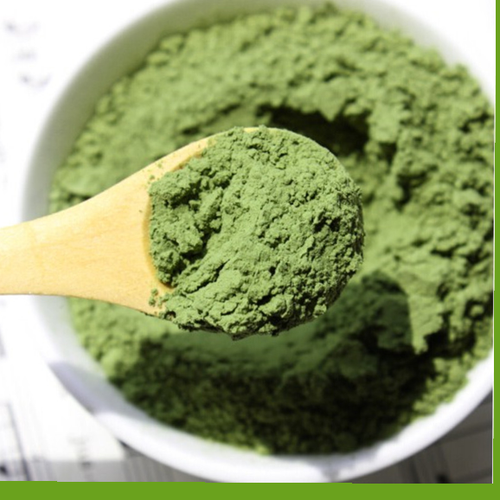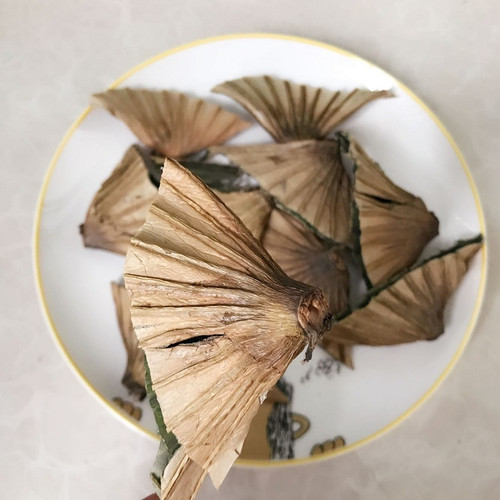Product Overview
Parts used: Dried leaf
TCM category: Herbs that clear Heat and purge Fire and/or clear Summer Heat
TCM nature: Neutral
TCM taste(s): Bitter
Meridian affinity: Spleen Stomach Liver
Scientific name: Nelumbo nucifera
Other names: Indian lotus, Sacred lotus, Bean of India, Egyptian bean, Héyè
Use of lotus leaves (He Ye) in TCM
Please note that you should never self-prescribe TCM ingredients. A TCM ingredient is almost never eaten on its own but as part of a formula containing several ingredients that act together. Please consult a professional TCM practitionner, they will be best able to guide you.
Preparation: The leaf is slightly moistened with water, shredded and dried
Dosage: 3 - 9 grams
Main actions according to TCM*: Relieves Summer Heat. Lifts the Spleen Yang. Halts bleeding caused by Heat or Stagnation.
Primary conditions or symptoms for which lotus leaves may be prescribed by TCM doctors*: Diarrhea Fever Summer Heat Nosebleed Hematochezia Bloody sputum
Contraindications*: This herb should not be used when there is a Cold Deficiency pattern.
Common TCM formulas in which lotus leaves are used*:
For Summer-Heat with fever, severe thirst and reduced urine combine lotus leaves with talc (Hua Shi), korean mint (Huo Xiang), eupatorium herbs (Pei Lan) and job's tears (Yi Yi Ren).
Key TCM concepts behind lotus leaves (He Ye)'s properties
In Traditional Chinese Medicine (TCM), lotus leaves are plants that belong to the 'Herbs that clear Heat and purge Fire and/or clear Summer Heat' category. Herbs in this category are used to clear inflammatory and infectious conditions, referred to as 'Internal Heat' in TCM. This is why most of the herbs in this category will have both antibacterial and antiviral properties. In TCM one has too much 'Heat' in their body as a result of a deficiency of 'Yin' (which is Cold in nature, see our explanation on Yin and Yang) or, more commonly, an excess of Yang (Hot in nature). Herbs that clear Heat and purge Fire treat the latter and as such tend to be Cold or Neutral in nature.
As suggested by its category lotus leaves are plants that are Neutral in nature. This means that lotus leaves typically don't affect the balance in your body. Balance between Yin and Yang is a key health concept in TCM. Eating too many "Hot" (Yang) ingredients can lead to an imbalance whereby one has a Yang excess. The inverse is true as well: too many "Cold" (Yin) ingredients can lead to a Yin excess. The Neutral nature of lotus leaves means that you don't have to worry about that!
Lotus leaves also taste Bitter. The so-called "five elements" theory in Chinese Medicine states that the taste of TCM ingredients is a key determinant of their action in the body. Bitter ingredients like lotus leaves tend to have a cleansing action on the body by clearing heat, drying dampness and promoting elimination via urination or bowel movements.
The tastes of ingredients in TCM also determine what organs and meridians they target. As such lotus leaves are thought to target the Spleen, the Stomach and the Liver. In TCM the Spleen assists with digestion, blood coagulation and fluid metabolism in the body. The Stomach on the other hand is responsible for receiving and ripening ingested food and fluids. It is also tasked with descending the digested elements downwards to the Small Intestine. The Liver is often referred as the body's "general" because it is in charge of regulating the movements of Qi and body fluids. It also takes a leading role in balancing our emotions.
Use of lotus leaves (He Ye) as food
Lotus leaves are also eaten as food. It is used as an ingredient in dishes such as Lo Mai Gai (Steamed Sticky Rice in Lotus Leaf).






